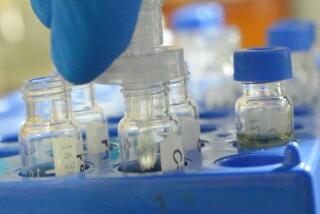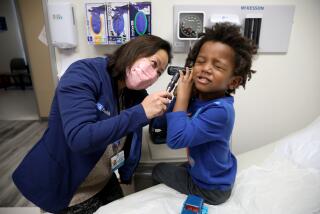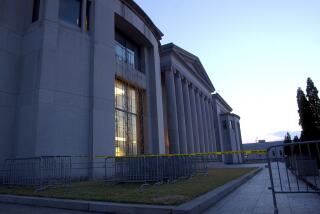State Not Liable for Baby Test Results
SAN FRANCISCO — Parents cannot hold the state liable for inaccurate or incomplete results from mandatory health screening for newborns, even if errors lead to severe disabilities in children, the California Supreme Court held Monday.
The ruling, the court’s first on a program that tests hundreds of thousands of newborns in California each year, came in a case brought by the family of Sierra Creason, 7, who must use a wheelchair, has severe lung problems and mental retardation.
Like all California newborns, she was screened at birth for various genetic defects that can be treated if they are discovered early. The state reported that she was negative for congenital hypothyroidism.
In their lawsuit, Claudia and Matthew Creason alleged that their daughter was born without a thyroid--a small gland in the neck that produces hormones that help control how the body grows and develops. The family blames faulty state measuring standards for failing to detect the defect.
If her condition had been known, Sierra could have received treatments during her first few months of life that would have prevented her grave disabilities, her parents contend.
The state denied responsibility, insisting that Sierra’s condition stemmed from an abnormality that the test was not designed to detect.
Siding with the state, the high court unanimously overturned a Court of Appeal decision that would have allowed parents to collect damages from the state if they proved their case at trial. The Supreme Court reasoned that the screening program is generally beneficial and would be severely undermined if it were vulnerable to litigation.
“The facts of this case are heart-rending, and the desire to afford the stricken child and her parents some measure of comfort and financial assistance is strong,” Justice Joyce L. Kennard wrote in a concurring opinion.
But a flood of litigation could eliminate the screening, creating “more rather than fewer of these tragedies,” Kennard wrote.
From 1980 to 1995, 7.4 million infants were tested in California, and 2,271 cases of congenital hypothyroidism were detected, the justice noted.
Harrison W. Sommer, the Creasons’ lawyer, argued that a ruling in the child’s favor would not have spawned a multitude of lawsuits because the state program only tests for rare diseases. One in every 25,000 to 50,000 children born in the United States is stricken by Sierra’s condition, in which both the pituitary and thyroid glands are dysfunctional.
The child’s pediatrician would have been alerted to a possible problem if the state had reported the exact laboratory values rather than just giving a negative result, Sommer argued. The test results indicated a possible problem but did not fall within the parameters the state considers abnormal, he said. The state at one time retested in cases where initial results fall into a gray area but has since stopped, he said.
Monday’s ruling “is probably going to result in more Sierra Creasons down the road,” Sommer added. “I hope the state will make adjustments that need to be made in this program.”
The court, however, said state physicians have the discretion to set the standards for positive and negative findings. The Legislature did not intend “to open the courts to wide-ranging claims attacking the accuracy or medical acceptance of state-developed testing and reporting standards,” Justice Ming W. Chin wrote for the court.
The Creasons, who live in Desert Hot Springs, traveled here recently for the Supreme Court’s hearing on their case. Sierra, her body limp, sat outside the courtroom doors in a wheelchair. A caregiver tended her.
Her parents, seated inside, grew more and more upset as the justices appeared to be supportive of the state. Claudia Creason sobbed while her husband tried to comfort her.
Deputy Atty. Gen. Joel A. Davis, who defended the state, said Monday’s ruling appears to protect the state’s newborn and other screening programs from a wide array of lawsuits. He was aware of a handful of lawsuits similar to the Creasons’, including a complaint pending in Ventura.
“The screening programs are an important governmental function, and they cannot possibly discover every abnormality,” Davis said.
Although test errors are extremely rare, he said, “doctors would be well-advised to understand they cannot blindly rely on these tests.”
More to Read
Sign up for Essential California
The most important California stories and recommendations in your inbox every morning.
You may occasionally receive promotional content from the Los Angeles Times.











